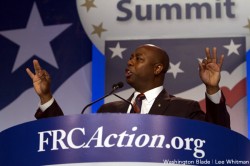News
Anti-gay speakers take stage at Values Voter Summit
‘There is no reason that man needs to change the definition of marriage’


Conservative commentator Ben Carson opposes same-sex marriage. (Washington Blade photo by Lee Whitman)
Anti-gay views were largely downplayed on stage Friday during the first day of an annual gathering for social conservatives, although some political commentators bared their teeth against the LGBT community.
Ben Carson, a former neurosurgeon at Johns Hopkins University who was recently hired by Fox News as a commentator, echoed his previous opposition to “change the definition” of marriage to include same-sex couples during the Values Voter Summit, which is hosted by the Family Research Council.
“We need to recognize that God created the family structure for a reason and marriage is a sacred institution from God himself, and there is no reason that man needs to change the definition of marriage,” Carson said.
Carson said “it is true” that people should “be respectful” of everyone’s rights and expressed support for some kind of contractual agreement between same-sex couples, but drew the line at marriage equality.
“And I personally believe that any two adults have the right to bind themselves legally in such a way that they have visitation rights, property rights, various other rights,” Carson said. “But that does not require to change the definition of marriage.”
But the most extreme anti-gay sentiment on stage came from Sandy Rios, host of the American Family Association’s “Sandy Rios in the Morning,” who railed against what she called health risks of homosexuality — taking note of the high rate of HIV infection in the gay community — as well as relationship issues she says gay men face.
“Because the love is misplaced they find themselves in a series of heartbreaking situations,” Rios said. “In the homosexual life, especially with men, there are so many partners, there’s so much heartbreak and rejection. You think youth is worshipped in heterosexual sex? It is top of line. And they like young men, young virile men. When you get older when you’re a gay man, there’s so much rejection, there’s heartache.”
Further, Rios dismissed the notion that the death of Matthew Shepard in Laramie Wyo., in 1998, was a bias-motivated crime, and said it was instead the result of a drug deal gone bad, pointing to a recent book by gay journalist Stephen Jimenez to back up her claims.
Rios said social conservatives will continue to offer gay people “hope and redemption,” pointing to those who identify as “ex-gay” as examples. She said gay people who have undertaken ex-gay sexual orientation conversion therapy — a practice debunked and condemned by mainstream psychological groups — are unable to tell their stories “because they’re maligned and threatened.”
“There are tons of ex-gays with fabulous stories that the American people don’t even know about,” Rios said.
Additionally, Rios criticized the Southern Poverty Law Center for identifying the Family Research Council and the American Family Association as hate groups and refusing to apologize for it after a gunman attempted a mass shooting at the Family Research Council headquarters last year.
But for the most part, conservatives abstained from making anti-gay comments on stage. The major focus was screeds against abortion, the implementation of health care reform and blaming President Obama and Democrats for the government shutdown.
Carson, who’s black, won significant media attention and applause for comparing the health care reform law to slavery.
“Obamacare is really, I think, the worst thing that has happened in this nation since slavery,” Carson said. “And it is – in a way, it is slavery, in a way because it is making all of us subservient to the government.”
More than 2,000 people were estimated to have registered for the summit, according to the Family Research Council. That’s slightly less than the estimated 2,500 people who attended the summit last year during a presidential election.
Another reference to same-sex marriage came from Sen. Tim Scott (R-S.C.), who criticized Obama for not enforcing marriage laws along with other laws, including the individual mandate in health care reform.
“I think about how our president is today picking and choosing the laws he wants to enforce,” Scott said. “We cannot have a president who picks and chooses, who says, ‘I don’t really like the marriage law,” so he isn’t enforcing it. He says, ‘I don’t like the immigration law, so I’ll go around it.’ He says, ‘I don’t even like the Obamacare law, so I’m going to delay part of it.'”
Presumably, Scott was referring to President Obama’s decision to no longer defend the Defense of Marriage Act against litigation, which led to the Supreme Court’s decision to overturn Section 3 of the law. However, Obama continued to enforce the law even as he refused to defend the law in court.
Sen. Mike Lee (R-Utah) also made a reference to “traditional marriage,” but as part of a litany of reasons why the Republican Party needs to focus more on the family.
“For the rapid changes that we’ve seen in America in recent years have only made the family more important, not less,” Lee said. “The family is the foundation not only of our society, but also of our economy, our culture and our Republican form of government.”
Sen. Ted Cruz (R-Texas) received significant attention for his speech, but focused for the most part on his objections to health care reform and his pursuit of defunding the law. The senator also accused of the administration of telling “servicemen and women that they cannot share their faith or risk discipline.”
Multiple times during his speech, protesters interrupted Cruz. One called on him to support a pathway to citizenship for undocumented immigrants, a provision of immigration reform that he has opposed.
The stronger anti-gay sentiment was seen at the convention booths across the hall at the Omni Shoreham Hotel. Kiosks were set up by the National Organization for Marriage, the Liberty Counsel, the Heritage Foundation and Parents and Friends of Ex-Gays & Gays.
Attendees who spoke with the Washington Blade weren’t enthusiastic about expressing their opposition t0 same-sex marriage.
Drew Grotelueschen, a 20-year-old student from Trinity International Law School, said he’s “not really sure” if the country is settling on accepting same-sex marriage, but wasn’t against the idea.
“Honestly, with the culture right now, it’s probably leaning more toward making gay marriage free everywhere, but I’m not sure yet,” Grotelueschen said. “I haven’t thought it that much.”
Diane Orosz, a 20-year-old student from University of Buffalo, said she opposes same-sex marriage on the grounds that gay couples can’t procreate, but seemed resigned to the idea that it’s legal in many places.
“With the society that we do have, it’s more liberal,” Orosz said. “I feel as though, unfortunately, there might be a settlement on gay marriage itself, but I don’t agree with [it.]…Love, the feeling, the emotion is the same, but marriage defines a man and a woman and their union together…Unfortunately, with our more liberal society, and free hippy type of society, I feel like gay marriage is inevitable.”
Sen. Marco Rubio (R-Fla.) expressed a view in favor of “social issues,” but didn’t articulate with detail what they consist of or voice any anti-gay sentiment.
“And I’ve also been lectured, as many of you have, about how we need to stop talking about social issues if we want to win elections,” Rubio said. “But if we’re serious about saving the American dream, we can’t stop talking about these issues. We can’t stop talking about the importance of our values and our culture. We can’t stop talking about them because the moral well-being of our people is directly linked to their economic well-being.”
District of Columbia
Gay ANC member announces candidacy for Ward 1 D.C. Council seat
Community leader Brian Footer seeking seat held by Brianne Nadeau

Gay Advisory Neighborhood Commissioner Brian Footer, a community activist who has been involved for many years in local and national government affairs, has announced his candidacy for the Ward 1 D.C. Council seat up for election in 2026.
Footer, a Democrat, will be running in the city’s June 2, 2026, Democratic primary for the Ward 1 Council seat, but it is uncertain whether he will be running against incumbent Ward 1 Council member Brianne Nadeau (D). Nadeau has not yet announced if she plans to run for re-election for a fourth term following her 12 years on the Council.
Nadeau has been a longtime vocal supporter of the LGBTQ community.
If Footer were to win the primary and the November 2026 general election, he would become the Council’s second openly gay member. Ward 5 Council member Zachary Parker (D) is currently the 13-member Council’s only gay member.
Footer is a three-term ANC commissioner who currently serves as Chair of ANC 1E, which represents the city’s Adams Morgan neighborhood.
“Brian has worked at every level of government — federal, state, and local — building a career rooted in public service, aging policy, and inclusive urban planning,” a statement on his campaign website says.
“I’m running for Council because too many people in Ward 1 are doing everything right and still feel ignored by the city they call home,” Footer states on his website.
“I’m running because we can do better,” his statement continues. “That means making housing more affordable, addressing homelessness with real solutions, and keeping our neighborhoods safe with smart, community focused strategies.”
When contacted by the Washington Blade for comment, Nadeau said she was not ready at this time to discuss her plans about running again or about Footer’s candidacy.
“The primary is a ways away, and I’m very focused right now on the budget and the stadium deal and all the work that we’re doing at the Council,” she told the Blade. “So, I really haven’t had time to turn to my plans. So, as a result, I’m also not going to be commenting on anybody else who is determined that they’re running at this time.”
She first won election to the Council in 2014 after she defeated four-term gay Ward 1 Council member Jim Graham in the Democratic primary after Graham became embroiled in an ethics controversy.
In the 2022 Democratic primary Nadeau defeated gay challenger Salah Czapary in a three-candidate race, by a margin of 48.5% of the vote compared to Czapary’s 30.9%.
With the third candidate, Sabel Harris, receiving 20.4%, the outcome showed that the two challengers had a combined total vote count higher than Nadeau.
Further details of Footer’s candidacy can be accessed from his campaign website, brianfooterdc.com.
Spain
Spanish women detail abuses suffered in Franco-era institutions
Barcelona-based photographer Luca Gaetano Pira created ‘Las Descarriadas’ exhibit

A Barcelona-based photographer, audiovisual artist, and activist has created an exhibit that profiles Spanish women who suffered abuse in institutions that Gen. Francisco Franco’s dictatorship established.
Luca Gaetano Pira, who is originally from Italy, spoke with women who the regime, which governed Spain from 1936-1975, sent to Women’s Protection Board institutions.
The regime in 1941 created the board the country’s Justice Ministry oversaw.
Franco named his wife, Carmen Polo, as the board’s honorary president. Then-Prime Minister Felipe González fully dissolved the board in 1985, a decade after Franco’s death.
Gaetano’s exhibit is called “Las Descarriadas” or “The Misguided Women” in English.
“These are women who were detained between 1941 and 1985 for reasons that are unthinkable today: being lesbian, poor, pregnant out of wedlock, rebellious, politically active … or simply considered ‘morally suspect,'” Gaetano noted to the Washington Blade.
Groups affiliated with the Spanish Catholic Church ran these institutions. Gaetano pointed out they were “presented as social assistance centers.”
“In reality, they were spaces of punishment and forced reeducation, where isolation, unpaid work, and psychological violence were the norm,” he said. “Many of the survivors are still alive. Their testimonies are powerful, urgent, and of extraordinary current relevance.”
The regime sent more than 40,000 women to Women’s Protection Board institutions.
“Despite its seemingly benevolent name, it was in fact one of the most powerful instruments of moral and social control over women during and after the dictatorship,” notes the exhibit. “Under the guise of care and re-education, this institution functioned as a repressive apparatus that punished women who deviated from the ideal feminine model imposed by Franco’s regime: submissive, obedient, married, and dedicated to motherhood within the Catholic family structure.”
The Spanish Catholic Church last month issued a public apology, but Gaetano described it as “very soft” and noted “the women did not accept it.” Gaetano also compared the Women’s Protection Board institutions to Ireland’s Magdalene Laundries.
The Associated Press notes tens of thousands of “fallen” women were sent to the laundries that Catholic nuns operated in Ireland from the 18th century until the mid-1990s. Then-Irish Prime Minister Edna Kenny in 2013 issued a formal apology for the abuses that women suffered in the laundries and announced the government would compensate them.
The Spanish government has yet to offer compensation to the women abused in Women’s Protection Board institutions.
“My work focuses on recovering the historical memory of marginalized communities, particularly through the portrayal of survivors of institutional violence and the use of archival materials,” Gaetano told the Blade, noting he has also sought to highlight the repression that LGBTQ people suffered during dictatorships in Portugal and Latin America.
Gaetano’s exhibit can be found here:
District of Columbia
Gay GOP group hosts Ernst, 3 House members — all of whom oppose Equality Act
Log Cabin, congressional guest speakers mum on June 25 event

U.S. Sen. Joni Ernst (R-Iowa) and three women Republican members of the U.S. House appeared as guest speakers at the June 25 meeting of Log Cabin Republicans of D.C., the local chapter of the national LGBTQ Republican group with that same name.
The U.S. House members who joined Ernst as guest speakers at the Log Cabin meeting were Celeste Maloy (R-Utah), Kat Cammack (R-Fla.), and Julia Letlow (R-La.).
Neither D.C. Log Cabin Republicans President Andrew Minik nor spokespersons for Ernst or the three congresswomen immediately responded to a request by the Washington Blade for comment on the GOP lawmakers’ appearance at an LGBTQ GOP group’s meeting.
“Please join us for an inspiring evening as we celebrate and recognize the bold leadership and accomplishments of Republican women in Congress,” a D.C Log Cabin announcement sent to its members states.
“This month’s meeting will highlight the efforts of the Republican Women’s Caucus and explore key issues such as the Protection of Women and Girls In Sports Act and the broader fight to preserve women’s spaces in society,” the message says.
It was referring to legislation pending in Congress calling for banning transgender women from participating in women’s sports events.
According to media reports, Ernst and the three congresswomen have expressed opposition to the Equality Act, the longstanding bill pending in Congress calling for prohibiting discrimination based on sexual orientation and gender identity in the areas of employment, housing, and public accommodations.
The Log Cabin announcement says the meeting was scheduled to take place at the Royal Sands Social Club, which is a restaurant and bar at 26 N St., S.E. in the city’s Navy Yard area.
D.C. Log Cabin member Stuart West, who attended the meeting, confirmed that Ernst and the three congresswomen showed up and spoke at the event.
“It was a good turnout,” he said. “I would definitely say probably 30 or 40 people attended.” West added, “Four women came to talk to a group of mostly gay men. That’s something you don’t see very often.”
-

 Federal Government2 days ago
Federal Government2 days agoTreasury Department has a gay secretary but LGBTQ staff are under siege
-

 Virginia3 days ago
Virginia3 days agoDefying trends, new LGBTQ center opens in rural Winchester, Va.
-

 District of Columbia2 days ago
District of Columbia2 days agoGay GOP group hosts Ernst, 3 House members — all of whom oppose Equality Act
-

 Opinions4 days ago
Opinions4 days agoUSAID’s demise: America’s global betrayal of trust with LGBTQ people














